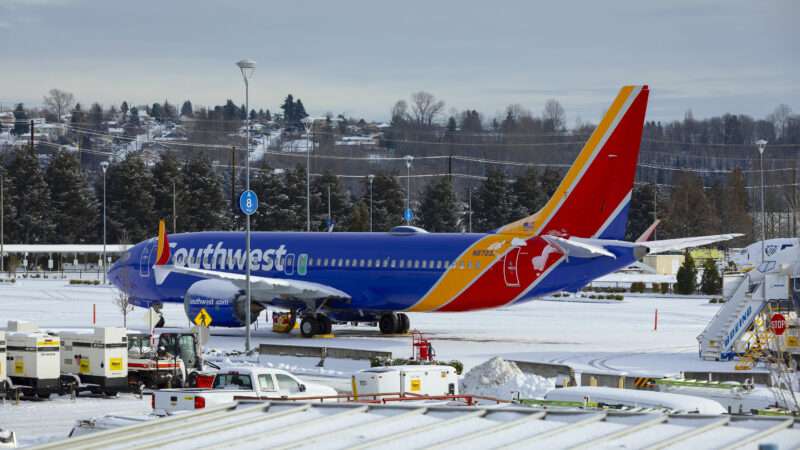
In the wake of the Christmas 2022 breakdown of airline service, politicians and consumer advocates are calling for tougher antitrust policy and even the re-regulation of U.S. airlines. While a once-in-a-generation blizzard encompassing about three-quarters of the continental U.S. would obviously disrupt air (and rail and highway) travel, especially over a major holiday weekend, most airlines recovered pretty well from this unprecedented storm.
But not Southwest. With outdated flight- and crew-scheduling technology, the popular lower-cost airline melted down, stranding huge numbers of holiday travelers. To get planes and crews to where they need to be to restore normal service, Southwest has temporarily canceled a large fraction of its near-term schedule.
Some critics blame Southwest's operating model, which is based on point-to-point flights rather than the hub-and-spoke model used by major carriers such as American, Delta, and United. In a major disruption like the December blizzard, hub-and-spoke yields less dispersion of aircraft and crews and does make it easier to return to normal. But point-to-point enables an airline to serve a greater number of smaller cities without transfers at hubs, which is popular with passengers and yields more daily passenger miles per plane than the hub-and-spoke approach. That's why most low-cost carriers, such as Allegiant, Frontier, JetBlue, and Spirit (plus Ryanair and EasyJet in Europe) also operate point-to-point.
Southwest's problem is that its leadership, after legendary founder Herb Kelleher retired, were financial guys, not operations specialists. Southwest's unions are right in pointing to the airline's low-tech crew-scheduling software called SkySolver as the culprit in the December breakdown. It was also at fault in a smaller but still devastating Southwest breakdown last year linked to an unexpected air traffic control (ATC) outage in the Federal Aviation Administration's (FAA) Jacksonville control center.
So what does this have to do with antitrust policy or the idea of re-regulating airlines? Nothing whatsoever. Sen. Elizabeth Warren (D–Mass.) has seized on this one-airline debacle to call for a crackdown on airline mergers. Even more ludicrously, her ally Matt Stoller of the American Economic Liberties Project has suggested going back to the federal airline regulation that was in place from the 1930s to 1978, claiming in a recent post that this "was a terrific system which saw dropping ticket prices and expanding capacity." Neither is true.
The Civil Aeronautics Board (CAB) ran an airline cartel that banned price competition and severely limited entry by new airlines. Airlines could only compete on amenities like drinks and meals. Most routes had only one or two airlines. And the regulation was cost-plus. Airline unions loved this because large increases in wages and benefits were blessed by the CAB and passed along to airline passengers.
Under this system, about half of what the airlines transported was air—i.e., empty seats. Flying was so expensive that most passengers were upper-middle-income or business travelers on expense accounts. I grew up in an airline family prior to deregulation. The only reason we took airline trips was the ready availability of employee passes; we could not have afforded tickets for five people on my father's salary. But because an average of half the seats were empty, we nearly always got on to our first-choice free flights.
Thanks to years of research by economists explaining the flaws of this system, a bipartisan Congress deregulated the airlines in 1978, allowing open entry and real price competition. In the four and a half decades since then, air travel has been democratized, to the huge benefit of most Americans.
Stoller is very misleading in his description of the industry: "Airlines are a public utility system, funded by the public on behalf of the public. Airports, air traffic control, safety inspections, bailouts—it's all public." In fact, although most U.S. airports (unlike those in Europe and Australia, which are mostly privatized) are run by government agencies, nearly all the large and medium ones are mostly self-supporting from their various revenue sources: airline charges, passenger charges, retail and parking revenues, etc. Likewise, although the FAA provides ATC services, the 80 percent of its budget that covers those costs comes from passenger ticket taxes (user taxes), not federal taxes on everyone. And in most developed countries, the former government ATC providers have been privatized or corporatized, made self-supporting from user fee revenues.
Southwest has lost tremendous goodwill from its winter debacle. It will likely lose market share and market value, and it will have to work very hard to rebuild trust by implementing long-needed technology upgrades. But changing federal airline policy isn't the solution.
The post What the Southwest Meltdown Means for Airline Policy appeared first on Reason.com.







